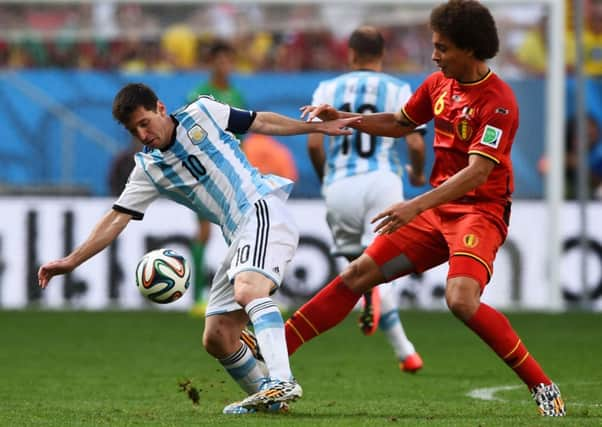Argentina 1 - 0 Belgium: Messi’s men march on


This was another one-goal victory, but it was by far Argentina’s best performance so far, a game in which, having taken the lead, they repeatedly threatened to exploit the space left behind a surprisingly limp Belgium as they were forced to chase the game.
Playing Belgium, of course, raised memories of Maradona’s superlative performance in the 1986 semi-final when he scored two memorable individual goals. On the day he equalled Maradona’s tally of 91 caps – an astonishing figure for a player who has just turned 27 – Messi produced no equivalent heroics, but he was again the central figure, both commander and artist, in a win that was far more emphatic than the scoreline might suggest.
Advertisement
Hide AdAdvertisement
Hide AdOne of Argentina’s most disappointing players so far in this tournament had been Gonzalo Higuaín, who has not been fully fit and has struggled to assert himself. With the Napoli striker ineffective and with Sergio Aguero never at his best because of a hamstring problem that affected the end of his season for Manchester City, Argentina have struggled to play with the fluency which took them to the top of the Conmebol qualifying group as top scorers, in part because of the efforts of their coach, Alejandro Sabella, to cover for the injuries with tweaks to the formation.
Sabella perhaps thought that in the 4-4-2 that he used against Switzerland with the wide men inverted so Angel di Maria is constantly cutting in off the right flank, he had found a system that can carry Argentina to success, but he was forced to tinker again 33 minutes into the first half as Di Maria limped off, having seemingly strained a thigh in attempting a shot that was blocked by Vincent Kompany. On came Enzo Perez in his place. He had an excellent season for Benfica, and there are those who had wondered why, given Fernando Gago’s struggles, he hadn’t been given an opportunity in the centre. He took Di Maria’s place on the right, but is a far less creative player, giving the midfield a more conservative aspect.
By then, though, Argentina had a lead to defend and Sabella, who has been much criticised in this tournament and has responded with a series of leaden, almost sullen, press conferences, could take credit for Argentina’s opener, scored after eight minutes.
He had brought Lucas Biglia in for Gago and the Lazio midfielder and Javier Mascherano combined to dispossess Vincent Kompany. Mascherano, of course, fed Messi – Pablo Zabaleta had acknowledged that getting the ball to Messi was always his first priority – and he, pivoting superbly, laid in Di Maria. The Real Madrid midfielder’s attempt to slide a pass through for the overlapping Zabaleta was thwarted, but the ball bounced to Higuaín, who, with Kompany still out of position, gleefully smacked a first-time shot on the turn into the bottom corner, ending a six-goal drought, his longest in an Argentina shirt.
Higuaín looked sharper than in any previous match, having one shot deflected just wide early in the second half, before nutmegging Kompany only for his shot to clip the bar and go over. On the bench, Sabella fell backwards, seemingly expecting another member of the coaching staff to catch him; they didn’t and he stumbled awkwardly.
Belgium had seemingly decided the best way to take on Argentina was to try to focus on exposing their defensive vulnerability, rather than simply stifling Messi, as Iran and Switzerland had done. The result was surprising amounts of space for Messi, who, for the first time in the tournament, was able to perform a true playmaking role, picking passes from deep, but also an examination for Ezequiel Garay and Martin Demichelis, brought in to replace Federico Fernandez. By and large, they passed it, with Divock Origi a peripheral figure before being removed just before the hour, although they weren’t entirely comfortable. Sergio Romero was called into one slightly awkward save to his right in the first half to beat away a long-range effort by Kevin de Bruyne. Just before half-time their marking collapsed completely as Kevin Mirallas got across the near post to send a diving header just wide, and there was more panic late on than ideal.
It was, though, yet again Messi’s game. Marouane Fellaini was supposed to be dealing with him, but galumphed about midfield swatting at shadows and becoming increasingly infuriated. In one attempt to dispossess him, he ended up committing three separate fouls before eventually bringing Messi to earth just outside the box. And Messi, although still running less than any other outfielder, exerted an influence from deep and made a real defensive impact for the first time on the tournament. In that, perhaps, he resembled less Maradona than another Argentine great, Alfredo di Stefano, who collapsed with a heart attack during the game and was taken to hospital in Madrid. Messi’s 40-yard pass that led to Di Maria’s injury was almost absurdly precise, curved into his path like a crown-green bowler shaping a wood to the jack.
Argentina seemed to tire late on, perhaps the result of that extra time against Switzerland, but Belgium still rarely looked like breaking through. This was a far better display by Argentina but perhaps the most encouraging thing for them is the promise of further improvement to come.
Advertisement
Hide AdAdvertisement
Hide AdArgentina: Romero; Zabaleta, Demichelis, Garay, Basanta; Di Maria (Perez 33), Biglia, Mascherano, Lavezzi (Palacio 69); Messi; Higuain (Gago 80).
Belgium: N Courtois; Alderweireld, Kompany, Van Buyten, Vertonghen; Witsel, Fellaini; Mirallas (Mertens 60), De Bruyne, Hazard (Chadli 75); Origi (Lukaku 60).
Referee: Nicola Rizzoli (Italy). Attendance: 68,551.